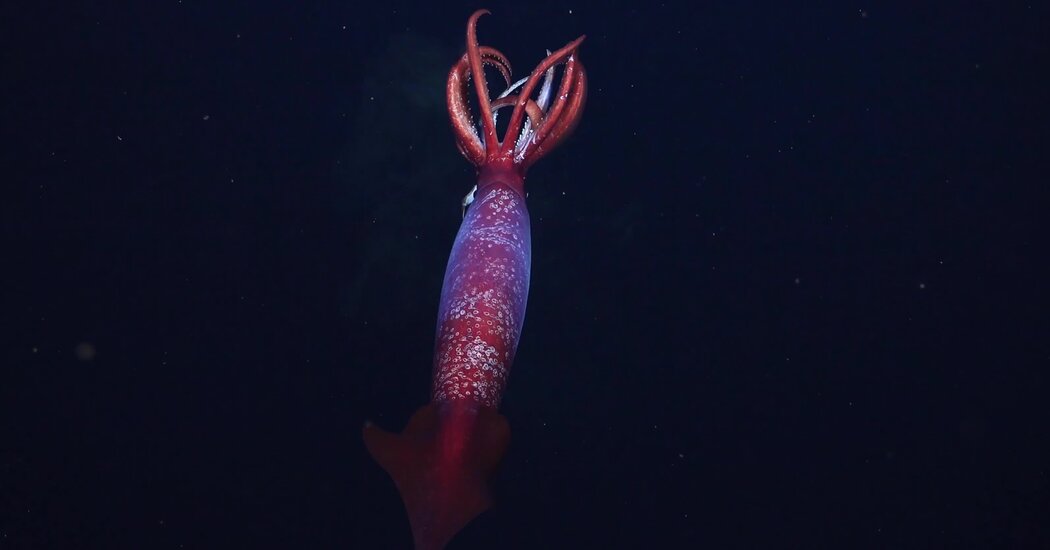The deep-sea environs of the Earth’s poles are home to mysterious ocean creatures: giant sea spiders, Antarctic sea pigs, phantom jellyfish. Finding and identifying these animals can be difficult, however; some are known only because researchers found their remains in fishing nets or in the bellies of seabirds. But on Christmas Day last year, the crew of the R/V Falkor (Too), the Schmidt Ocean Institute’s research vessel, caught sight of a creature never before seen alive.
This particular dive was part of the National Geographic and Rolex Perpetual Planet Expedition, an initiative to document climate change in the mountains, rainforests and oceans.
The team had planned to deploy its remotely operated vehicle, SuBastian, in a site known as the Powell Basin, but the movement of ice blocks forced the group to explore the region’s outer edges instead.
When the submersible dropped 7,000 feet, the team unexpectedly spotted a shadow through the live feed, which turned out to be an Antarctic gonate squid, a rare species of cephalopod, three feet long and releasing a green cloud of ink.
“It was a beautiful squid,” said Andrew Thurber, a deep-sea researcher at the University of California, Santa Barbara, who was aboard the vessel. “You see beauty all the time in the deep ocean, and this was just one classic example of it.”
No Antarctic gonate squid had ever been seen alive before, as far as the team was aware. They followed it for a couple of minutes and made sure to record it on video, capturing the creature’s red coloration and white spots.
“Videos like this get me really excited,” said Linsey Sala, a museum scientist who manages the pelagic invertebrate collection at Scripps Institution of Oceanography and was not involved in the expedition. Discoveries of species like this “can be really informative to how they live life at great depths,” Ms. Sala said. Unidentified specimens might be sitting in collections around the world, she added, in which case the video footage could be helpful in revealing what they are.
Previous sightings of this species of squid have been limited to individuals caught by fishing vessels and squid remains found in other marine animals, mostly in the Falkland Islands.
“It’s always exciting to see live footage of a critter that was known only from dead specimens previously,” said Bruce Robison, a deep sea ecologist at the Monterey Bay Aquarium Research Institute who also was not involved in the expedition.
For those aboard the vessel, the discovery was “sheer elation,” Dr. Thurber said. There was a fever of excitement even before they had properly identified the squid. To verify the species, Dr. Thurber and his colleagues sent the images captured by the underwater vehicle to taxonomists around the world.
Kat Bolstad, a cephalopod biologist at the Auckland University of Technology in New Zealand, helped identify the animal. The squid’s sex and age were difficult to determine, but the single hook in each tentacle, seen through the images sent to her, confirmed that the species was Gonatus antarcticus.
The hooks might be helpful for securing and latching onto prey, a characteristic shared with other squids. The squid also had scratches on its arms and sucker marks on its mantle, possibly from a recent attack by another sea creature.
Deep-sea squids are hard to encounter and document. Conducting research thousands of feet below the sea surface is challenging and expensive, and the animals tend to avoid remotely operated vehicles, which are often noisy and bright. These vehicles are “aliens of the deep,” Dr. Thurber said. “So it really depends on them to come and look at us.”
This was not the first elusive squid to be filmed by SuBastian, the remotely operated vehicle. This year, the submersible also caught sight of a colossal squid, Mesonychoteuthis hamiltoni, a century after the animal was first described in a scientific paper.
But much less is known about the Antarctic gonate squid, which lives in the waters of the southern ocean and spawns at depths below 2,000 feet.
Penguins in the region are known to feast on Antarctic gonate squid — smaller ones, anyway. They also are preyed upon by colossal squid, which share the same depths and waters.
The discovery promises to shed light on the lives of Antarctic gonate squids and sets up even more questions. How far do these squids move? How wide is their range? What are they feeding on in the deep? How much bigger do they grow?
“We know so little about that community that there could be all sorts of things going on that we can only wonder about,” Dr. Robison said.


